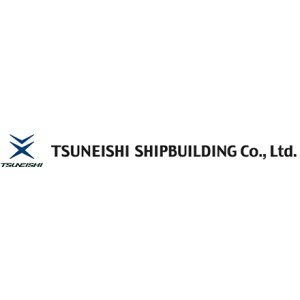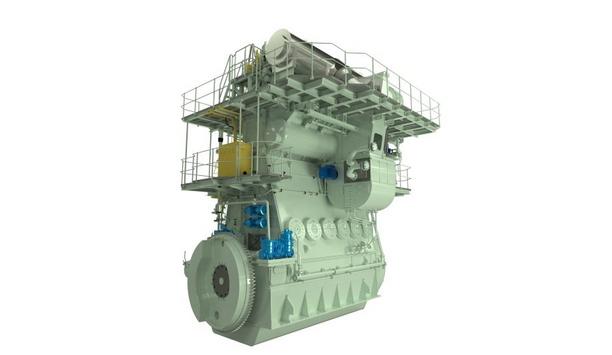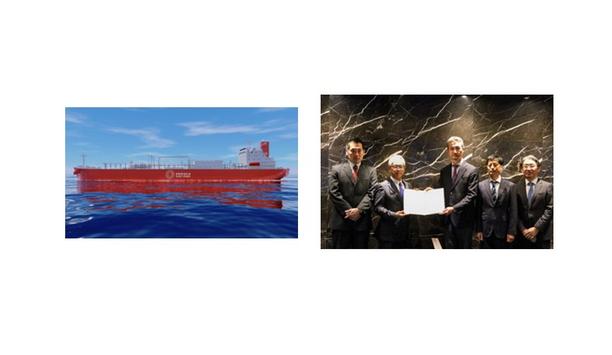Tsuneishi Shipbuilding Co., Ltd. - Experts & Thought Leaders
Latest Tsuneishi Shipbuilding Co., Ltd. news & announcements
ClassNK has issued an approval in principle (AiP) for the design concept of a retrofitted Kamsarmax bulk carrier, converting it from conventional fuel to methanol dual-fuel, jointly developed by Tsuneishi Shipbuilding Co., Ltd. and Fonden Mærsk Mc-Kinney Møller Centre for Zero Carbon Shipping. This certification demonstrates the regulatory feasibility of the ship, serving as a meaningful step in advancing the transition of the existing fleet to alternative fuels, as bulk carriers of this size are widely operated now. New methanol fuel tanks The design concept was set as part of a project exploring the conversion of Tsuneishi’s Kamsarmax The design concept was developed as part of a project exploring the conversion of Tsuneishi’s Kamsarmax bulk carrier standard design to a methanol dual fuel configuration. Aiming to establish a model that could pave the way for a broader green transition within the medium-sized bulk carrier sector, the project is working through retrofit challenges, such as determining the location of the new methanol fuel tanks. Fuel supply systems ClassNK carried out a design review of the design concept based on ‘Part A Guidelines for Ships Using Methyl/Ethyl Alcohol as Fuels (Edition 3.0.0)’ of the ‘Guidelines for Ships Using Alternative Fuels’ and examined the risk assessment through HAZID. ClassNK issued AiP upon confirming the feasibility of key design, including the arrangement of methanol fuel tanks and fuel supply systems, in terms of regulatory compliance. ClassNK will continually strive to contribute to advanced decarbonisation initiatives through safety assessments and more.
Japan’s Tsuneishi Shipbuilding Co., Ltd. has ordered 3 × MAN B&W 7G50ME-C9.6-LGIM (-Liquid Gas Injection Methanol) main engines in connection with the building of 3 × 81,200 dwt bulk carriers for Danish shipping company, J. Lauritzen. Each engine will feature MAN Energy Solutions’ proprietary EGRBP (Exhaust Gas Recirculation ByPass) emissions-reduction technology. MITSUI E&S will build the engines in Japan. Zero-carbon emission Bjarne Foldager, Head of Two-Stroke Business, MAN Energy Solutions, said: “We are currently experiencing a wave of ME-LGIM orders and it is great to see such a respected company as J. Lauritzen joining the decarbonisation journey. While car carriers have been to the fore recently, we ultimately expect methanol to figure prominently as a future fuel across all vessel segments and these newbuildings will be capable of trading carbon-neutrally when powered by green methanol and bio-fuel oils. We value this collaboration with J. Lauritzen and appreciate the trust it has placed in us.” The Kamsarmax vessels will be among the very first methanol-capable bulk carriers in the world The Kamsarmax vessels will be among the very first methanol-capable bulk carriers in the world and will be fully owned by Lauritzen NexGen Shipping, which J. Lauritzen and Lauritzen Bulkers A/S reportedly will use as a platform for further investments in zero-carbon emission and future-proof assets for the shipping industry. The vessels have been ordered in cooperation with Cargill, the American global food corporation, who will operate the vessels for a minimum period of seven years. Fuel-propulsion solutions Thomas S. Hansen, Head of Promotion and Customer Support, MAN Energy Solutions, said: “With more than 160 orders and 500,000 running hours accumulated on methanol, the ME-LGIM engine is proven technology and the defacto industry standard for the methanol propulsion of large merchant-marine vessels.” “As the engines are readily available and methanol dual-fuel types have a lower capital outlay compared to other, alternative fuel-propulsion solutions for ships, we expect to win further orders within the bulk-carrier segment over the coming months and years.”
Tokyo-based classification society, ClassNK has issued an Approval in Principle (AiP) for an ammonia fuelled gas carrier, which has been jointly developed by Mitsui O.S.K. Lines, Ltd., TSUNEISHI SHIPBUILDING Co., Ltd., and Mitsui E&S Shipbuilding Co., Ltd. Ammonia is expected to be used as a ship fuel for decarbonisation, since it does not emit CO2 when combusted. Meanwhile, adequate safety measures are imperative, as it has been pointed out that ammonia is toxic to humans and corrosive to materials. Zero-emission ships using ammonia fuel ClassNK has been involved in projects aiming for zero-emission ships using ammonia fuel ClassNK has been involved in projects aiming for zero-emission ships using ammonia fuel, in terms of safety assessment, and has issued its ‘Guidelines for Ships Using Alternative Fuels’ as a necessary standard to minimise the risks related to ammonia fuelled ships for the ships, crews, and environment by stipulating requirements for installation, controls, and safety devices. The vessel uses some of its ammonia cargo as fuel, and is targeting to achieve net zero CO2 emissions, while underway. ClassNK’s review on jointly developed design for vessel ClassNK carried out the review on jointly developed design of the ammonia fuelled medium size gas carrier, in line with Part C of its guidelines, and examining the risk assessment through HAZID. Upon confirming it complies with the prescribed requirements, ClassNK issued the AiP. Speaking on the occasion, Mr. Ken Furuya, Executive Officer, General Manager of Sales Dept., Mitsui E&S Shipbuilding said, “We, Mitsui O.S.K. Lines, TSUNEISHI SHIPBUILDING and Mitsui E&S shipbuilding, would like to express our appreciation to ClassNK and Lloyd’s Register for the support and cooperation to this joint development project." Mr. Ken Furuya adds, "This AiP is an important mile stone for us. We will continue to make an effort to complete this project successfully.” Clean ocean transport solutions The three companies are committed to playing a role in society’s overall decarbonisation efforts" Mr. Ken Furuya adds, “Anticipating an increase in the need for ammonia as a marine fuel and greater demand for transporting it, the three companies are committed to playing a role in society’s overall decarbonisation efforts, by providing clean ocean transport solutions with the zero emission ocean-going vessels.” Mr. Masaki Matsunaga, Corporate Officer, Director of Plan Approval and Technical Solution Division, ClassNK said, “ClassNK is honoured to have had the opportunity to be involved as a certification body in this concrete effort toward decarbonisation through close collaboration among MOL, TSUNEISHI SHIPBUIDLING, and Mitsui E&S Shipbuilding, and has issued the AiP as a milestone.” ClassNK offers support through technical expertise Mr. Masaki Matsunaga adds, “For the project’s target to achieve net zero CO2 emissions, while underway, we will continue to provide necessary support through its technical expertise.” Outline of the vessel: LOA: About 180 metres Breadth: About 30 metres Depth: About 19 metres Cargo tank capacity: About 40,000 cubic. metres Main engine: MITSUI-MAN B&W type S60 two-stroke dual-fuel ammonia engine (under development)



